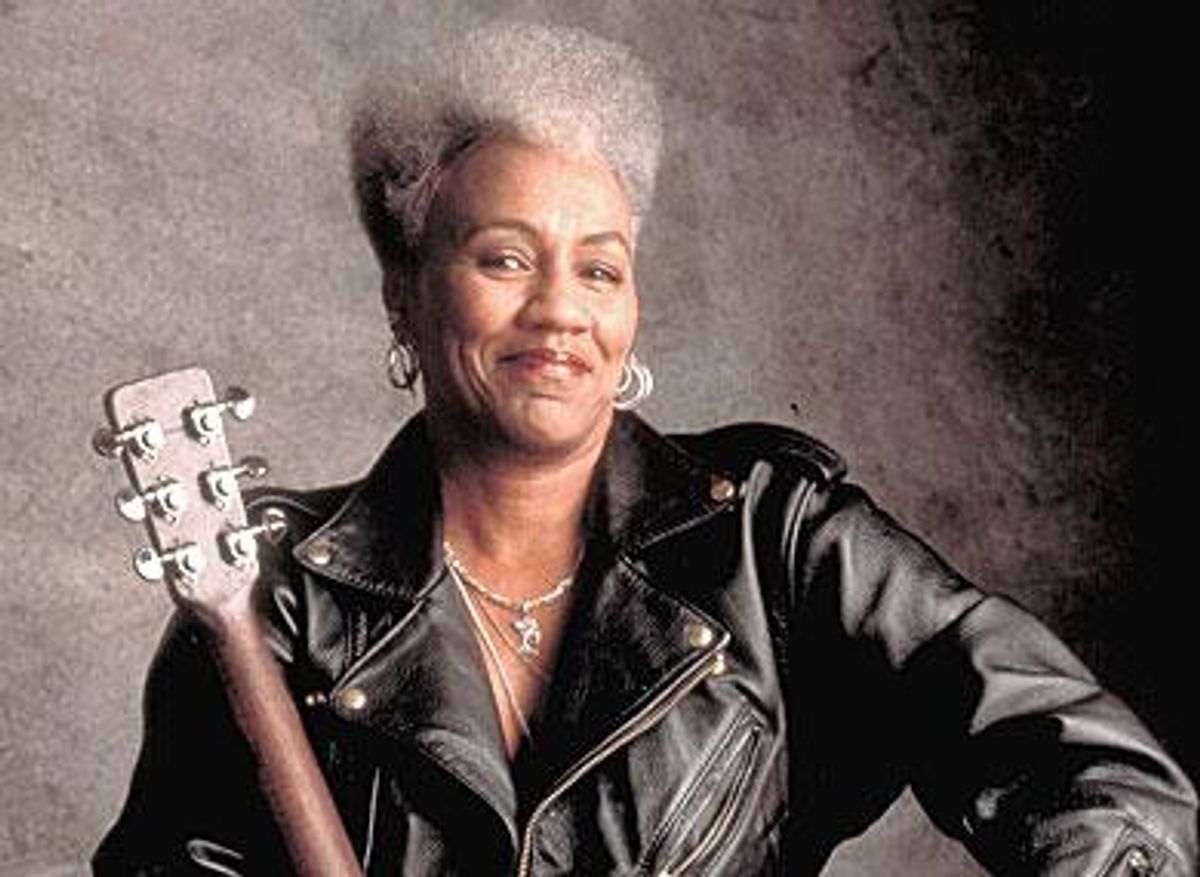Think blues: Think bawdy, zaftig, shake-that-thang women who sing about sex with unabashed hunger in thinly disguised double entendres. Think Ma Rainey, Bessie Smith, Alberta Hunter, Big Mama Thornton, Etta James. And think Saffire: The Uppity Blues Women, modern purveyors of classic blues who are calling it quits after 25 years of shouting and growling about everything from good loving to silver beavers (yep) to big butts to bitches with bad attitudes.
But they're not leaving without a final 12-bar hurrah -- a last album showing off their great chops and eclectic blues tastes, Havin' the Last Word (Alligator). It's hardly the last word, however, for the three members of Saffire -- Gaye Adegbalola, Andra Faye, and Ann Rabson, all talented singers and multi-instrumentalists, who each have solo careers as well. As for the one lesbian in the bunch, Adegbalola -- a strikingly handsome, tatted, silver-haired African-American woman -- her last solo album indicated the fling-open-the-closet direction she'll be going without her longtime sidekicks: It was titled Gaye Without Shame , all entendres well-intended.
Advocate.com chatted on the phone with Adegbalola recently; she was home in Fredricksburg, Va., before setting off on a final tour with the band.
How did you get the name Saffire? A sapphire is a blue gem, it's semiprecious, it's multifaceted. And Kingfish's wife [on the famous '40s/'50s radio and TV show Amos and Andy ] was Sapphire -- a strong, mouthy woman. But we spelled it differently, long before the rappers did things like that, so that it had fire in it. We had to append The Uppity Blues Women to it because we were contacted by a lawyer for a singer named Sa-fire.
You were already in your 40s when the band started -- this was a second career after having been a science teacher. How did people react to a blues band composed of midlife women? When we started out, the people who wrote about us would say, "They're all women." Then they would say, "They're all old women." Then, "They're old bawdy women." Then, [considering Adegbalola is black and her cohorts white] "They're old, culturally diverse, bawdy womenaEUR|"
What is it about the blues that draws you -- and listeners -- to it? I like to think of the blues as the poor woman's psychiatrist. It's a music of liberation. There's something about a flatted third that just takes you somewhere else.
How did you get involved in music and in the blues? My father had a band -- he played the drums, mainly -- and they were weekend warriors. And my mom ran the youth canteen and would bring old records home. The thing that turned me onto the blues was that every summer we'd go to this amphitheater and hear Harry Belafonte and Ella Fitzgerald. Belafonte had Sonny Terry and Brownie McGhee on the bill. I played flute in high school.
But then you learned guitar in the 1970s from your Saffire-mate-to-be Ann Rabson, formed Saffire, and decided to take a year off teaching. I was a good teacher, so I wasn't worried about getting another job. Science teachers are at a premium. Lo and behold, our first year out there a song I wrote ["Middle-Aged Blues Boogie," which took blues song of the year honors] paid my son's way through college.
Saffire will be ending as a group in November -- why now? We've been working our kind of blues together for 25 years, and all of us individually do other stuff. As one ages -- and I just got my Medicare card! -- you want to pick and choose where you put your energy. So it's good and bad [to be ending].
You married and had a son -- when did you figure out you were gay? I've known I was a lesbian longer than I knew that I was black. I know, that's deep. I'm told I would not go to sleep until the girl next door would come and talk to me. And the girl who lived next door looked like a black Liz Taylor. I knew it when I married, but it wasn't something I could act upon then.
Lesbianism has snuck its way into the blues for decades, hasn't it? Yes, down through the ages, starting back with Ma Rainey and Bessie Smith and Alberta Hunter, most of the women blues singers were bisexual if not flat-out lesbians. All I knew was that their music resonated with me -- even if it was totally about men. Ma Rainey in 1926 recorded "Prove It on Me" [I went out last night with a crowd of my friends / It must've been women, 'cause I don't like no men..."], but even then she didn't come out. And a woman named Lucille Bogan sang a song in the mid 1930s, "B.D. [bull dagger] Woman's Blues" -- "They've got a head like a sweet angel, but they walk just like a natural man." So I'm just continuing their tradition.
You recorded both those songs with gay piano player Roddy Barnes on your solo album Neo-Classic Blues in 2004. But I guess you'd call your 2007 album Gaye Without Shame your real coming-out album, right? Hell yes! It's audiobiographical. I was out of the closet, but not out of the room for years, because I was a schoolteacher here in conservative Virginia. But my bandmates were so supportive, I just stepped on out there. The first song on that album is "Queer Blues," and there are a couple of love duets with women. Part of my mission was to take blues to the queer audience, and queer issues to the blues audience. Heartbreak is heartbreak -- it doesn't have any color or agenda or age. And love is love. I'm proud to say I was nominated for a blues music award for the album -- like the country music awards, but very tiny.
Are you in a relationship now? I was in an 18-year relationship, and we just split up. We worked hard to fan the flames, but the thrill was gone. And here I am at 65, and it's hard to be starting over. Just like with Saffire, it's hard to conclude that journey. You can put in the article that I'm looking -- I don't have any problem with age, or with black or white. My former partner was 21 years younger; I am truly young at heart. Bring 'em on!
By the way, is Adegbalola your given or married surname? When I was married and living in New York, I really fell in love with the Yoruba religion -- it's kind of kin to Santeria [the Caribbean-originated set of beliefs that actually merges Yoruba religion with Catholic and Native American traditions]. One of the priests gave my husband that name; it means the king is coming into his crown. It means I'm reclaiming my royalty, that's a rough translation.
Your royal name certainly fits with your Nefertiti hairdo! I have wanted to change it, but it's really kind of like my trademark. I even decided I was going to get a wig -- which is contradictory to my whole natural thing -- so I went to the one wig store in town. But it was closed.

















































































